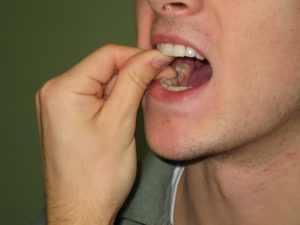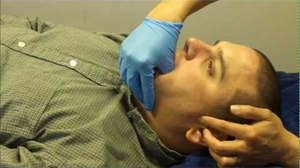nalco group
bone, muscle & joint pain physio
BOOK NOW / WHATSAPP ABOUT YOUR PAIN OR INJURY
- ORCHARD 400 Orchard Road #12-12 Singapore 238875
- TAMPINES 9 Tampines Grande #01-20 Singapore 528735
- SERANGOON 265 Serangoon Central Drive #04-269 Singapore 550265
Home > Blog > Physiotherapy > Conditions > Jaw Pain > Trismus Physiotherapy
Trismus Physiotherapy

Trismus is an uncontrolled inability or difficulty to open the mouth or jaw.
Trismus interferes with many daily activities be it
- chewing
- swallowing
- talking
- brushing teeth
- and even breathing
The condition may be caused by dental problems, cancer and cancer treatment, surgery, trauma, or other factors. With correct intervention from our senior physiotherapists, trismus can improve in time, and full jaw function may return.
What Is Trismus?
"Trismus" is a term used to describe any number of conditions that cause an uncontrolled inability to open the mouth or jaw.
The most common cause of trismus is inflammation of the soft tissue of the mouth due to:
- An impacted molar
- Removal of wisdom teeth
- Removal of the tonsils
Less common causes of trismus are:
- Radiation therapy to the face and neck
- Tetanus ("lockjaw"), an acute infection from bacteria that usually enter the body through a wound
- Myositis (muscle inflammation)
- Jaw nerve damage
- Adhesions, or scarring, of the tissues around the jaw or tongue, which can develop after a long period of not moving the jaw
- Muscle atrophy (wasting) that can occur after as little as 3 days of not opening the jaw
- Poor oral hygiene
- Tumors or cancer
- Trauma to the jaw area
- Diseases, such as lupus and scleroderma
Trismus can occur rather suddenly in the first 9 months after radiation near the temporomandibular joint (TMJ). After that time the risk still exists, but the tightness tends to develop more slowly. Risks are greater if radiation treatments were done in the area of the TMJ or muscles involved in chewing, and particularly increase with higher doses of radiation treatment.
Trismus tends to improve slowly.
Studies suggest treatment may take from 3 to 12 weeks. Early triasmus treatment is the best way to prevent more severe problems.
Our senior physiotherapists will design an individualized treatment program based on your specific condition to
- speed up the healing process
- reduce the feeling of tightness in the jaw area
- help restore your normal jaw joint movement and your ability to chew
Signs and Symptoms
Symptoms of trismus include:
- Increased jaw pain
- Inability to open the jaw (you cannot fit 3 fingers [lined up vertically] between the top and bottom teeth in the front of the mouth)
- A "spasm" or “tight” sensation when attempting to open the mouth
- Difficulty chewing
- Difficulty talking
- Difficulty breathing
- Difficulty brushing or flossing your teeth.
If you have trismus you may be at risk for choking.
Also, because you likely can't chew food as well, you might also have to change your diet, which could mean you're not getting adequate nutrition. Even just moving food around in your mouth may be difficult because the tongue also may lose some mobility, if it is affected by trismus.
If it is not diagnosed or treated, the disuse of the temporomandibular joint may lead to atrophy or wasting of the muscles that move the jaw, and possible deterioration of the TMJ surfaces.
Your medical team may suggest additional treatments to complement our senior physiotherapist’s treatment. The use of mouth splints to help with stretching has been proven effective. Other possible options include Botox injections to relax tight muscles, and surgery to muscle, bone, or the TMJ.
How Is It Diagnosed?
During your first visit with our senior physical therapists, we will:
- Review your medical history, and discuss any previous surgery, fractures, or other injuries to your head, neck, or jaw
- Conduct a physical examination of your jaw and neck (especially if you have neck pain)
- Evaluate your posture and how your neck moves
- Examine the TMJ to find out how well it can open, and whether there are any abnormalities in jaw motion since you developed trismus
- Consider whether you might be a candidate for an oral device to help regain motion, and refer you to a dentist
how our senior physiotherapists can help you

We can help restore the natural movement of your jaw and improve your daily function. Trismus tends to develop slowly. In some people, it progresses so slowly that they don't notice it until they can only open their mouths half-way.
Whatever point you are at, the sooner you see our senior physiotherapists, the better, because treatment that begins before trismus progresses is likely to be more efficient and effective.
Once you have received the diagnosis of trismus, we will select the appropriate treatments to improve your jaw movement and relieve pain.
Improve Your Jaw Movement
We may prescribe stretches and range-of-motion exercises for the jaw. The instruction will include individualized frequency and intensity of movements to ensure your safety.
We will recommend specific techniques, such as stretching or self-mobilization to minimize your pain and restore function.
Physical therapists also use skilled hands-on techniques (manual therapy) such as
to gently increase movement and relieve pain in tissues and joints.
We may teach you special "low-load" strengthening exercises, which do not exert a lot of pressure on your TMJ, but can strengthen the muscles of the jaw and restore a more natural, pain-free motion.
Wealso will teach you gentle exercises that you can do at home to help you steadily increase the opening of your jaw and improve the way it works.
Relieve Your Pain
If your pain is severe, we may apply physical modalities, such as
- ultrasound therapy
- radio-frequency Indiba physiotherapy
- dry needling
- electrical
stimulation
- heat therapy
- cold therapy
to reduce pain and improve motion.
